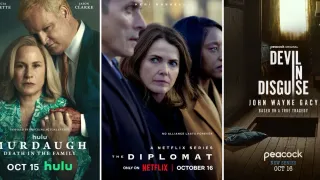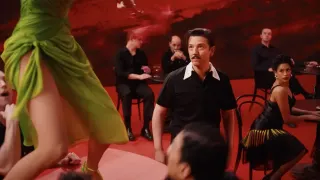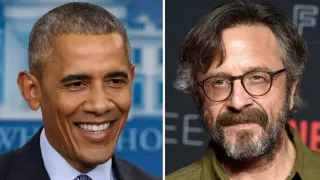July 29, 2015
Listen To Me Marlon
Frank J. Avella READ TIME: 4 MIN.
"Listen to Me Marlon" is one of the most revealing and enlightening bio-documentaries perhaps ever made. And I do realize what I just wrote, but I defy anyone familiar or unfamiliar (is there such a person) with Marlon Brando to not be astounded by the insights that are given into the mind of this tortured 20th Century genius.
Director Stevan Riley has fashioned a deeply personal, often-painful, unapologetically honest account of the life of one of the most celebrated actors of all time that attempts to search for the essence of the man and the artist.
The director weaves together an astonishing array of stills, footage (home movies, television interviews, scenes from his features) as well as audio, much of it being made public for the first time. Riley had access to over 200 hours of recordings the actor made during his life where he talked about everything from acting to activism. He shares his thoughts, feelings, ideas, and memories. It's a cornucopia of self-psychoanalytic archival material, revealing some of the mysteries of this celebrity.
The doc begins with Brando's voice, via a recording, stating, "I had my head digitized." We then see the fairly remarkable footage of his actual digitized face as he explains the process he went through in the '80s (via VFX using Cyberware, a then "cutting edge software.")
The fact that Riley tracked down this beguiling and creepy footage tells you just how all encompassing his research odyssey was.
"Actors are not going to be real," Brando continues. "They're going to be inside a computer. You watch. It's going to happen. So maybe this is the swan song for all of us."
In the 2013 film, "The Congress," Robin Wright sells her soul and has her entire self digitized so her cyber self can go on to perform as a fully animated avatar, and no one will ever know it isn't actually her. I assumed that film was completely sci-fi when I saw it.
Brando was way ahead of his time, as usual. But that didn't always translate into a fulfilling life.
As a child, Brando was shy and sensitive and those attributes never really vanished, they were simply eclipsed by a hard shell he was forced to create for himself.
The boy Brando grew up with an alcoholic mother who gave him "a sense of the absurd," and a traveling salesman father who never seemed to accept his son. Footage of the two on a TV show depicts just how awkward their relationship was. Unhappy growing up, Brando would escape to the movies.
The enigmatic figure became an actor "by accident," and went on to alter the course of stage and film acting (along with a handful of other "method" actors like Montgomery Clift, whom he is shown in a photo goofing around with). It was Stella Adler (who studied with Stanislavski) that believed in Brando so that she invited the young thesp into her home. "All acting today stems from Stella Adler," he boldly states.
Brando went on to become a stage sensation, starring as the brutish Stanley Kowalski in the Tennessee Williams play, "A Streetcar Named Desire," transforming traditional theatre acting expectations. From there he graduated to the big screen and became the youngest person to win the Best Actor Oscar for "On the Waterfront," in 1954.
Adulation, however, did not equal joy. It was quite the contrary, as he "struggled to preserve sanity and sense of reality that is taken away from you by success."
The doc delves deep into his work, not just on the more celebrated films like "The Godfather" and "Last Tango in Paris" (where director Bernardo Bertolucci demanded so much realism from the actor that when Brando saw the film he felt completely betrayed by the Italian master), but also fiascos like the "Mutiny on the Bounty" remake, Chaplin's "A Countess from Hong Kong," as well as a messy sex farce he was ashamed of called "Candy."
Riley also examines the politics of the man, fighting for civil rights and crying out against the injustices perpetrated on the American Indian that would result in the infamous refusal of his "Godfather" Oscar.
His own painfully tragic personal life is explored (and self-explored), including the kidnapping of his son, Christian, and his later trouble with the law and his daughter Cheyenne's tragic end.
And Brando's own flirty nature is captured as we see footage of him shamelessly hitting on a female journalist. "Past a certain point, the penis has its own agenda," Brando admits. He was certainly honest in his reflections, and that is one of the things that separates this account from most. Shockingly, it was the Brando estate that began the project, but there are no signs of attempting to whitewash or canonize.
One of the many amazing feats that Riley achieves is giving us such a great sense of the man. It's as if Brando were not only still alive (and he is and will always be, via his film performances) but that he is somehow in the room with the viewer watching the film and, often, commenting on it. It's difficult to explain just how immersive "Listen to Me Marlon" feels.
One complaint: Riley shows a lot of footage and photos, but decided to not label any of the other figures in these shots. I understand that the key focus was Brando and Brando only (in his Director's Statement in the press notes, Riley admits to having many conversations with people in Brando's life, but then making the decision that the only voice we would hear would be Marlon Brando himself), but I don't think a few names below images would have taken away from that.
"Unless we look inwards, we can never look outwards." There are so many pearls of wisdom spoken by Brando, but it's the bringing together of some of his complexities and contradictions, miraculously achieved in this documentary, that prove revelatory.






